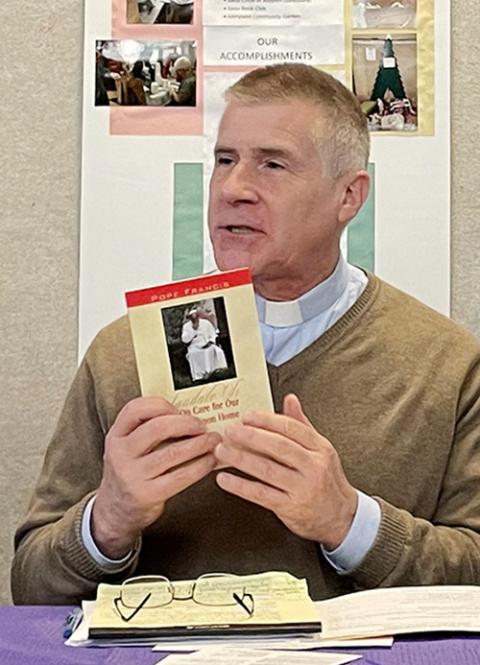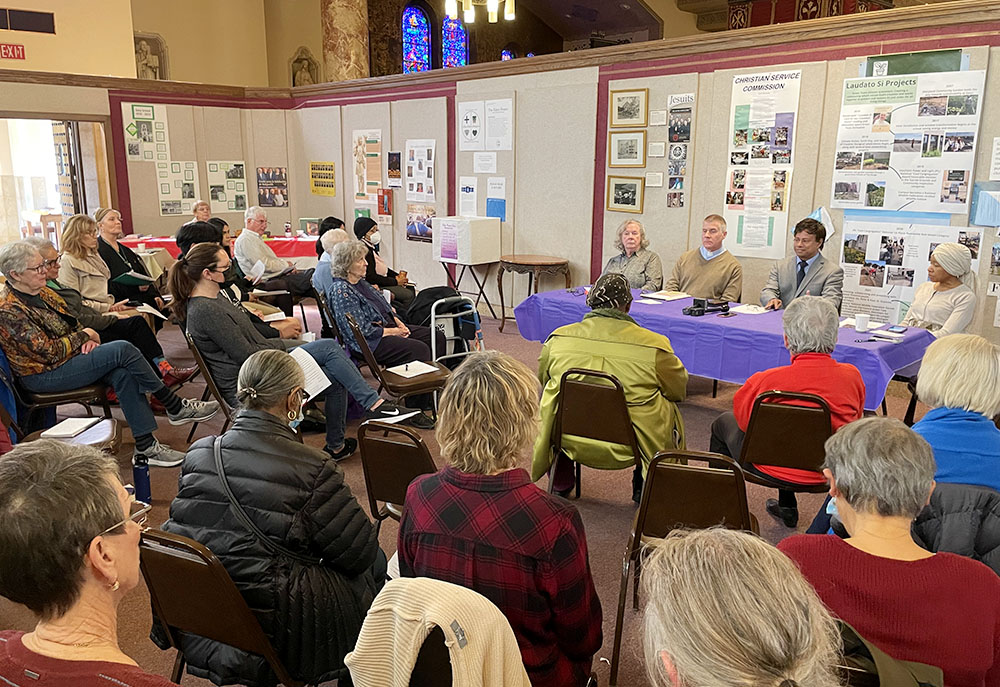
Panelists engage the room in conversation during the March 21 event titled "Detroit's Dirty Air: A Moral Response" at Gesu Catholic Church in Detroit. Panelists, from left, are Dominican Sr. Ellen Burkhardt, Jesuit Fr. Lorn Snow, U.S. Congressman Shri Thanedar and Laprisha Berry Daniels. (Amy Ketner)
In the U.S. city ranked 16th worst for soot pollution, Catholic leaders, environmental justice advocates and U.S. Congressman Shri Thanedar (D-Michigan) met to discuss proposed changes to national soot pollution allowance standards.
The conversation, held at Gesu Catholic Church on March 21, highlighted the impact of pollution on Detroiters, and the crucial need for Catholic leaders to publicly address this as a faith and moral issue. Approximately 50 Catholics, including members of religious orders and Detroit Cristo Rey High School students, attended the event, titled "Detroit's Dirty Air: A Moral Response." The event was organized by In Solidarity, a national organization that communicates Catholic social teaching in the public sphere.
In January, the U.S. Environmental Protection Agency proposed lowering the standards for allowable amounts of soot pollution from 12 micrograms per cubic meter of air, to 9-10 micrograms. Public health experts, environmental advocates and faith leaders are pushing for the standard to be set at 8 micrograms, a level that the Environmental Defense Fund claimed could avoid nearly 20,000 deaths annually.
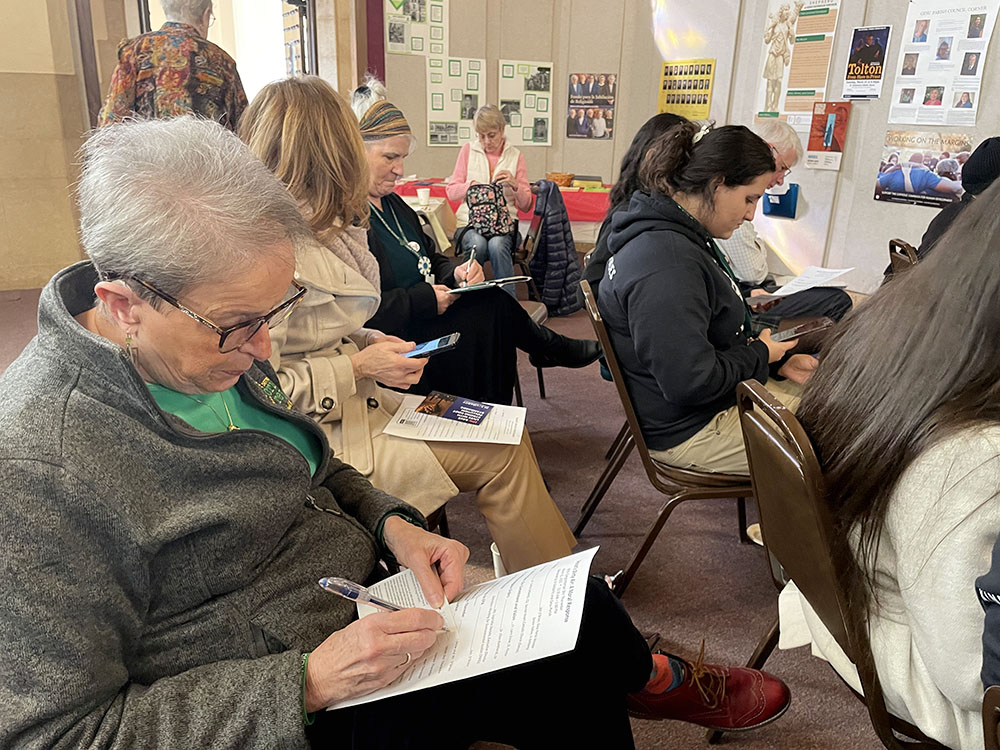
Event attendees, including Detroit Cristo Rey High School students, fill out postcards urging the Environmental Protection Agency to lower allowable soot pollution standards. (Amy Ketner)
Attendees at "Detroit's Dirty Air" were invited to submit public comments to the EPA and urge it to save lives by setting soot pollution standards to the amount "recommended by the EPA's own scientific advisory."
Jesuit Fr. Lorn Snow, Gesu pastor and event panelist, said, "I have the school next door, and the amount of children who are suffering from respiratory disease is phenomenal." He said those diseases are directly related to pollution.
Another panelist, Laprisha Berry Daniels, executive director of Detroiters Working for Environmental Justice, noted asthma and lead rates are high in the city. "Cardiovascular disease is highest in the nation in Detroit," she said, adding that Detroit's most polluted zip codes "are considered sacrifice zones and the people that live in those areas are considered sacrifice people. It is environmental racism."
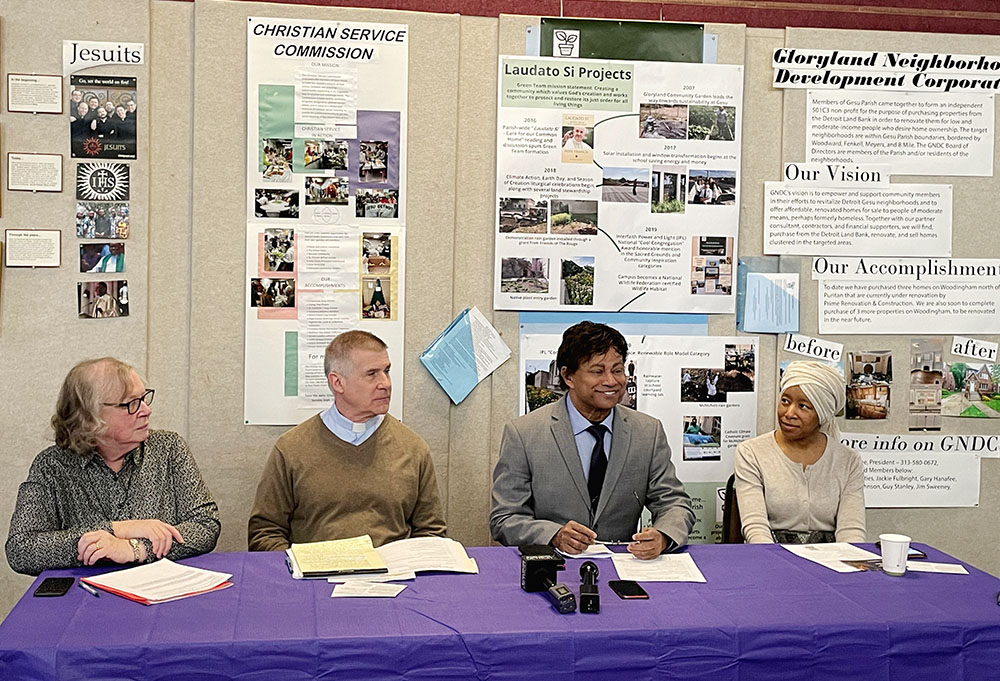
Detroit Catholic and environmental justice leaders dialogue with their congressman about soot pollution in Detroit's air. From left are Dominican Sr. Ellen Burkhardt, Jesuit Fr. Lorn Snow, U.S. Congressman Shri Thanedar and Laprisha Berry Daniels. (Amy Ketner)
"We felt as faith leaders we could speak on this moral issue," Snow said. "This is also a pro-life issue. The sanctity of life can only be fostered when we have a care for ... our environment."
Thanedar agreed with the panelists that the current EPA standards on soot pollution are not acceptable. He urged consideration of the combined effects of pollution from various factories, especially in places like Southwest Detroit, home to Michigan's most polluted zip code. Daniels echoed this idea, adding to the equation pollution from diesel trucks on the city's many highways and the bridge to Canada, located in Southwest Detroit.
One Southwest resident working on these issues, Theresa Landrum, said the EPA doesn't consider this cumulative impact. "They look at an individual company on its own and for each chemical that company emits, they set a standard. ... They don't look at them combined. ... They're creating a toxic soup that's having a serious impact on people's health."
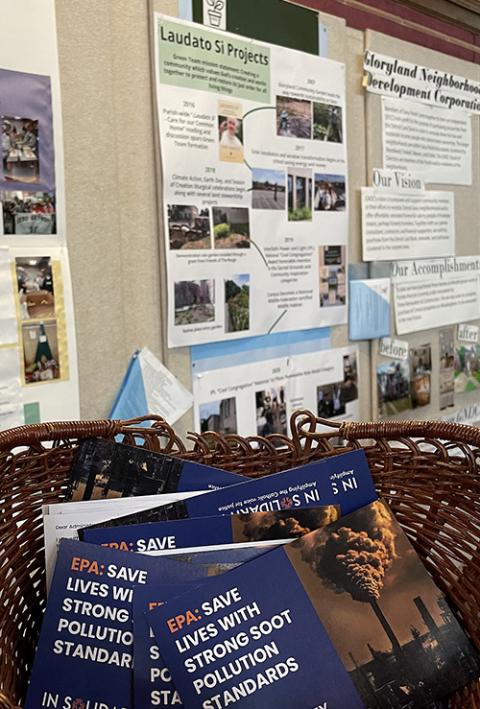
Postcards urging the EPA to lower allowable soot pollution standards are collected at the March 21 event at Gesu Catholic Church in Detroit. (Amy Ketner)
In addition to concern for the proposed new EPA standards, panelists called for greater enforcement on polluting corporations. Dominican Sr. Ellen Burkhardt said that while religious congregations are committed to the environment, there are certain things they cannot do that Thanedar can — including demanding the EPA increase enforcement of industrial polluters.
"Right now," she said, "if a company ... is polluting our environment, they get a ... small fine. ... This is just part of doing business in Detroit and everywhere. So, what we're asking for is greater enforcement, something that will matter to companies enough that they will change what they're doing."
The congressman agreed the fines should be higher, saying, "We absolutely must put people over profit." Thanedar said he has been in conversation with the EPA and has asked state regulators to do more inspections and monitoring.
Thanedar said it can take two years to identify polluters, followed by about six months to stop the pollution.
About the event, Patty Gillis, a volunteer with In Solidarity and one of the event's organizers, said, "When science and religion come together, you can get a lot done, and today was a real coming together of science and religion."
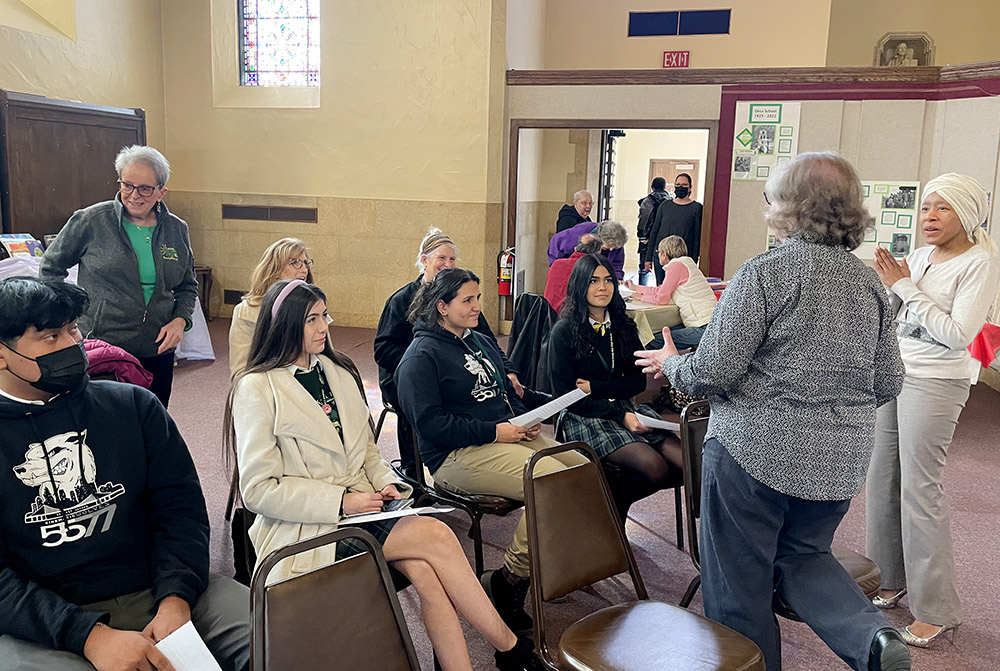
Dominican Sr. Ellen Burkhardt and Laprisha Berry Daniels speak with Detroit Cristo Rey High School students before the March 21 event titled "Detroit's Dirty Air: A Moral Response" began at Gesu Catholic Church. (Amy Ketner)
Daniels said she hopes Thanedar will make good on his promise to do a Southwest Detroit environmental tour to hear from those most impacted by pollution. She also hopes that Gesu and other parishes will engage in more advocacy work.
"The Catholic Church is a microcosm of the rest of the city," she said. "The fact that they are having these conversations and ... pulling together different stakeholders is exciting."
She wasn't the only one who weighed in on Catholics' role in this work. In an interview after the event, Thanedar said the faith community's "leadership is very critical. This is not just a legal issue, a scientific issue, it's also a moral issue. Environmental racism is something we need to fight. ... I want and need [faith leaders] to be my partners in this fight."
Others felt the church could do more. When asked about how she sees the Catholic Church responding to environmental injustices, Landrum was critical of the overall effort: "They're talking about spiritual health, but what about physical health?
Advertisement
Catholics in the room were also thirsty for a stronger response from their local Catholic community. Gillis did not hear about Pope Francis' 2015 encyclical, "Laudato Si', on Care for Our Common Home," through the parishes, but rather through religious communities.
Bill O'Brien, panel facilitator and In Solidarity Senior Fellow, and Gillis both believe religious congregations are paving the way for the rest of the local church.
O'Brien said the whole church — not just religious congregations — should be sharing in this work of environmental justice. To him, it's evangelization, an opportunity to engage and work with the local community, especially the young, Hispanic and majority Black population of the city, including the environmental activists and Cristo Rey students in attendance.
"We all need to be Laudato Si' parishes," said Snow. "I don't consider this teaching to be optional. It's part of the magisterium. ... Caring for creation is not just something we do, it's who we are."
He urged the Detroit Archdiocese and all its parishes to go through what he calls a Laudato Si' conversion process. Snow described Laudato Si' as the "heartbeat" of the Gesu community, where for years parishioners have organized a Green Team that helped the parish move toward installing sustainable gardens, solar panels and bio wells. He hopes the parish will be a zero-waste parish by 2025.
Gillis agreed with the pastor, saying Laudato Si' is "a great impetus. It's a beautiful document" and "part of Catholic social teaching, but unfortunately, we're not hearing about it as much in parishes as we need to."
She said that's part of what calls her to help facilitate these kinds of events. "The church in every generation has to figure out how to apply the Gospel to the signs of the times," she said. "People say, 'Oh, you're accommodating to the culture.' No. Jesus met people where they were at, and we need to do that, too."
Also providing leadership for the event was St. Joseph Sr. Cathey DeSantis, a member of Sacred Heart Parish in Detroit. This was the second time in recent history Detroit-area religious congregations and Catholic leaders of In Solidarity held a public dialogue with a U.S. representative about environmental concerns.

